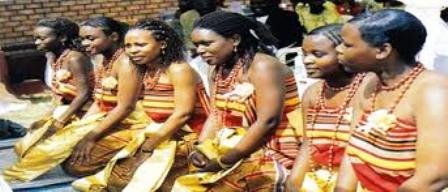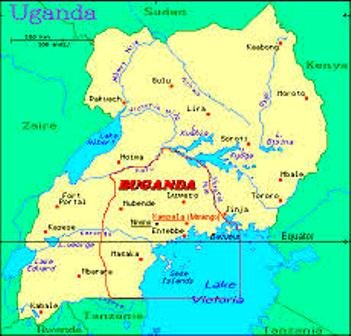Who are the Basoga People in Uganda? The Soga are the eastern neighbors of the Baganda.
They occupy the region between Lake Victoria and Lake Kioga the present districts of Kamuli, Jinja and Iganga. They make up about 8 per cent of the population.
Before the arrival of the Europeans, they had been subsistence farmers who also kept cattle, sheep, and goats.
They commonly maintained gardens for domestic use close to the homestead.
Early inhabitants of this region were Nilo-Hamitic tribes like the Langi und Iteso as well as the Bagisu (a Bantu tribe).
Subsequently, the Soga who had immigrated from the East expelled them and also adopted their traditions and lifestyle. The clan chiefs defined daily life in the society, and they distributed land for cultivation.
The clan chiefs defined daily life in the society, and they distributed land for cultivation.
Spiritual rites were performed by those authorized.
Ancestral worship was also practised, and many gods and semi-gods as well as Lubaale, their creator, were worshipped.
In general, they believed in animated nature which had to be offered sacrifices.Later on, the Soga got under the influence of the Baganda, as their dialect Luanda was closely related with the Busoga dialect Lusoga and as it was commonly used.
The Baganda dialect prevailed, as the Soga dialects were hard to understand by members of other Soga tribes.
According to a legend the excellent hunter Mukama immigrated with his entourage from the East into this region and assumed power here; his influence was even felt in the neighbouring Bunyoro.Supposedly, his son, who had been given the same name, stayed behind when his father moved on and ruled over Bunyoro. According to another legend, Kintu's son Mukama was left behind here as ruler, when his tribe moved on to Buganda.
Traditionally, the Busoga society consisted of a number of small kingdoms, and they were not united under a single paramount leader.
The community was organised around a number of principles, the most important of which was descent. Descent was traced through male ancestors, leading to the formation of the patrilineage, which included an individual's closest relatives.
This group provided guidance and support for each individual and united related homesteads for economic, social, and religious purposes. The women of the household cared for the most common staple foods, this is bananas, millet, cassava, and sweet potatoes.
Men generally cared for cash crops, these being coffee, cotton, peanuts, and corn. Lineage membership determined marriage choices, inheritance rights, and obligations to worship the ancestors.
An individual usually attempted to improve his economic and social position, which was initially based on lineage membership, by skillfully manipulating patron-client ties within the authority structure of the kingdom.
A man's patrons, as much as his lineage relatives, influenced his status in society. Unlike the Kabakas (kings) of the Buganda, Busoga kings are members of a royal clan, selected by a combination of descent and approval by royal elders.In northern Busoga, near Bunyoro, the royal clan, the Babiito, is believed to be related to the Bito aristocracy in Bunyoro. Some Basoga in this area are convinced that their ancestors are the people of Bunyoro.Due to the continuous movements and intermingling of the people within that region, the history of these people is complex.
It can be asserted however that the earliest inhabitants of Busoga belonged to the same Bantu group comprising the Batooro and Baganda.
Their origin can therefore be traced like other Bantu groups to the Katanga region of Central Africa.
Tradition holds that the earliest in habitants were the langi; the Iteso and Bagishu.
They were later engulfed by migrants from Buganda.
The earliest settlers in Busoga are said to have occupied Lake-shore areas of modern Bukoli Nyanyumba’s Banyankole are believed to have been among these earliest inhabitants.
These early settlements took place far back in the 14th century. They were later joined by other people from Mt. Elgon region.
These people are said to have been led by Kintu and are said to have settled in Bugabula and Bulamogi. They were later joined by others from Budama and some from Kigulu in Kenya.There are three legends regarding the origins of the Basoga. One of them talks of the famous hunter, Mukuma, who came from the East side of Mt Elgon and crossed via present Bugishu and Budama. He is said to have been accompanied by his wife, various followers and two dogs.
Mukuma had eight sons during his stay in Busoga. These sons were subsequently appointed rulers over certain areas.
Mukuma preceded to Bunyoro were he set up a Kingdom. He died of smallpox and that is why the relatives of Mukuma in Busoga do not look at a patient with small pox.It is also customarily that no member of the Ngobi clan passes another one with smallpox without touching him.
The second legend insists that Mukuma did not come to Busoga at all that Mukuma only sent his sons to rule Busoga because there were no capable rulers in Busoga.The third legend talks of Kintu having been the man called Mukama and it was this same Kintu who came to Busoga from the east of Mt Elgon.
This legend asserts that Kintu left his sons in Busoga and continued to Buganda. He is said to have returned to Busoga and lived in a place called Buswikira which is at Igombe, Bunya.
He died and was buried there. Afterwards, his tomb became a rock which is worshiped even today by some people.
Originally, these people were a disunited people. They could not unite even in the face of a common enemy. This explains why they were incessantly prone to foreign influence first from Bunyoro and later form Buganda.That resolved, the traditional marriage ceremony is considered done and the couple will be separated for a while and the girl coached by her senga on her marital duties.
After this, the couple is now free to live together. Most families end the reception with a party until dawn.
Traditionally, weddings were conducted by an elder who administered a concoction of herbs and blessed the couple. At such ceremonies, animals were sacrificed to pay respect to and ask for the blessings of the ancestors, followed with a cultural dance and songs while congratulatory gifts were offered to the newly wed couple.
However, with the Basoga now being one of the most religiously influenced tribes in Uganda, contemporary marriages are predominantly religious, with couples seeking God's blessings in houses of worship, in the presence of chosen witnesses and religious leaders.
As with most Ugandan ethnic tribes, in Busoga children are the ultimate goal of a marriage and according to Akuuwa Ekiiboono, if a couple's relationship was barren, it was typical for the man to have an automatic a right to opt for a divorce or marry another wife.
Families in Busoga were (and still are) very patriarchal in setting, with men undertaking most of the family's financial obligations through fishing and agriculture, while the women concentrate on domestic chores with the help of their female offspring.
Divorce was usually always in favor of the males. However, only in extreme cases of adultery or barrenness was it enforced.
The fulfillment of procreation and a life, not of solitude but of unity, has always been a remarkable ideal of the Basoga and for this, they have a motto; Busoga etebenkele ni Kyabazinga afunvuwaale! (Long live Busoga and long live our King!)
Hi! I am a robot. I just upvoted you! I found similar content that readers might be interested in:
https://www.govisitkenya.com/basoga-people.html
Downvoting a post can decrease pending rewards and make it less visible. Common reasons:
Submit
Congratulations @muzito08! You have completed the following achievement on the Steem blockchain and have been rewarded with new badge(s) :
You can view your badges on your Steem Board and compare to others on the Steem Ranking
If you no longer want to receive notifications, reply to this comment with the word
STOPVote for @Steemitboard as a witness to get one more award and increased upvotes!
Downvoting a post can decrease pending rewards and make it less visible. Common reasons:
Submit